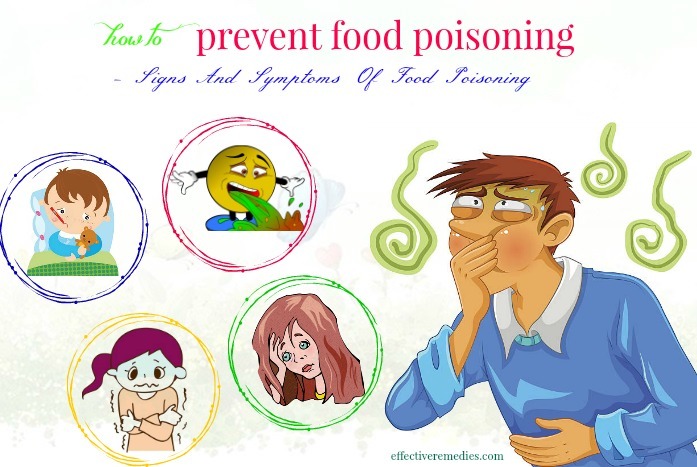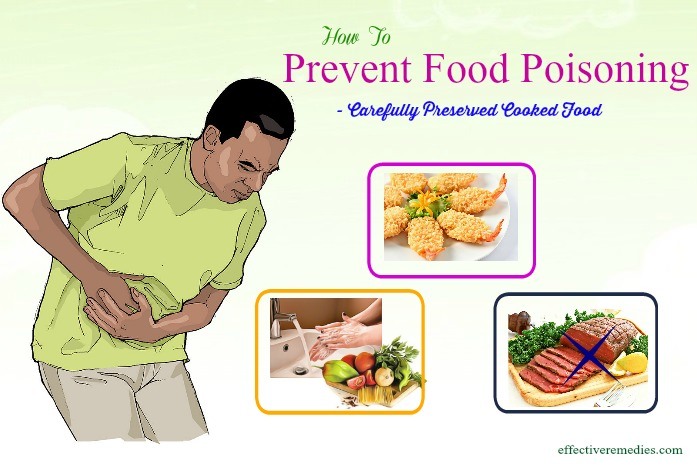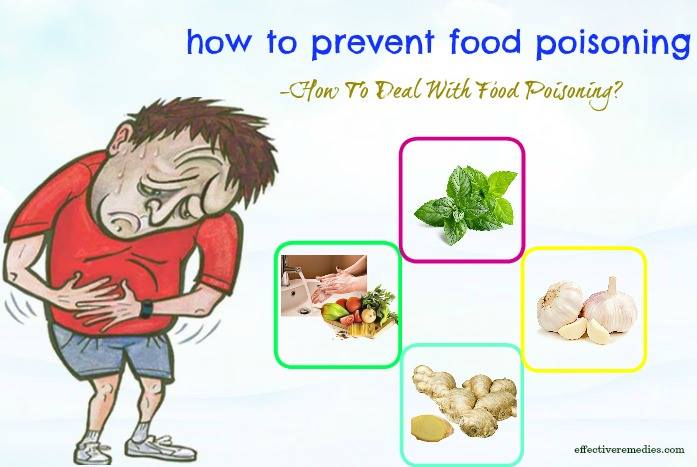Contents
Overview
At present, food safety is becoming a hot issue in the whole society. Therefore, what to eat to ensure the health of the whole family and prevent food poisoning is the top concern of the people. Continue reading this article on Effective Remedies to discover some of the best ways on how to prevent food poisoning naturally at home and then share your family and friends these useful ways.
- Science-based natural home remedies for food poisoning in adults
- Natural home remedies for vomiting in adults
- Best natural home remedies for nausea in adults
Why And How To Prevent Food Poisoning – A Must-Read Article
I. What Is Food Poisoning?
Food poisoning, also known as food poisoning, is the phenomenon of poisoning by eating or drinking contaminated food containing deterioration, rancidity, or preservatives.
According to research experts, food poisoning has two types: acute poisoning and chronic poisoning.
- Acute poisoning [1] is a type of poisoning that develops immediately after ingestion, with symptoms such as fatigue, dizziness, dizziness, nausea, abdominal pain, and lethargy. Even some cases of food poisoning not being promptly treated can also lead to death.
- Chronic poisoning is a form of poisoning that has no obvious signs and does not develop immediately after ingestion. In this form, the toxins accumulate in the body, affecting the metabolism; in the long run, it will lead to cancer and other serious illness.
1. What Causes Food Poisoning?
The causes of poisoning are varied but can be divided into four main groups:
- Food poisoning due to parasites: Bacteria, toxins viruses, parasites, mold, and yeast.
- Food poisoning due to food depletion, rancidity: Some foods when left to rancid often produce toxic substances. These substances are usually not destroyed or reduced to toxicity when boiled.
- Toxic food poisoning: Toxins are commonly present in some foods such as puffer fish, toadfish, bile carps, poisonous mushrooms, potato sprouts, and some legumes.
- Food poisoning caused by chemical substances: Food is cultured, processed in areas with water sources, soil contaminated with heavy metals; due to the residues of plant protection drugs and veterinary drugs; by food additives; due to radioactive substances.
2. Factors That Increase The Risk Of Food Poisoning
Many factors increase the risk of food poisoning, such as:
- Old age: The aging process makes your immune system weak and does not respond to harmful bacteria.
- Pregnancy: Pregnancy leads to some changes in metabolism and circulation, leading to high risk of food poisoning. Your reaction may get worse during pregnancy.
- Infants and children: This is an age when the immune system is undeveloped.
- People with chronic diseases: People who have diseases such as diabetes, liver disease or AIDS can be poisoned by food easily.
3. Signs And Symptoms Of Food Poisoning
EffectiveRemedies Partner Solutions

Ask a Doctor Online and Get Answers in Minutes, Anytime!
Have medical questions? Keep asking questions to a Verified Expert until you get the answer you need.
Some common signs and symptoms of food poisoning include:
- Vomiting, nausea, diarrhea
- Stomachache
- Fever
- Fatigue and lack of energy
- Anorexia
- Muscle pain
- Chills
II. 10 Best Tips On How To Prevent Food Poisoning Naturally At Home
1. How To Prevent Food Poisoning – Wash Hands
Many people always forget washing habits, especially washing your hands before eating and after using the toilet with soap is not widely applied. “Remember to wash your hands cleanly before meals and after using the toilet to save more lives than any antibiotic medicine. It can halve the number of cases of diarrhea in the world, reducing the number of deaths caused by pneumonia by half and by one-fourth from respiratory illnesses.”
Hand washing also needs to be correct and scientific to remove the pathogenic bacteria. Proper hand washing issued by the Ministry of Health includes six basic steps as follows:
Step 1: Wet your hands, take 3 – 5 ml of hand-wash or rub the soap onto your lap and two hands. Apply two palms together for evenly spreading soap.
Step 2: Place the palms of the hands and fingers of the hands on the back of the other hand and rub the palms of the hands and fingers.
Step 3: Put your palms together, rub your palms and fingers.
Step 4: Put your hands together and rub your fingers.
Step 5: Using the palm of this hand to rotate and clean the fingers of the other hand and vice versa.
Step 6: Rub the fingers into the palms. Rinse hands under the tap, and then wipe dry hands with a towel. The minimum hand hygiene time for the whole process is 30 seconds.
2. How To Prevent Food Poisoning – Choose Clean, Safe Food
Because there are many types of food, it is important to know how to choose safe foods such as how to choose meat, fish, vegetables, packaged food. The best way is to buy at real stores which are clean, safe, and secure. In fresh food stores, fresh goods are placed and sold on a daily basis, in addition to food preservation conditions that ensure food safety.
- With vegetables and fruits: Choose fresh vegetables and fruits, not crushed, no strange smell.
- Meat must be passed through veterinary quarantine and meet the standards of fresh meat.
- Fish and seafood must be fresh, keep the colors normal, no signs of pounding.
- Processed foods must be canned or packaged, and labeled with full contents such as product name, weight, main ingredients, storage, use and place of production. Processed foods need to have a production registration number and have an expiry date. With unchecked boxes, do not choose distorted, blown or rusted boxes.
- Do not use moldy foods.
- Do not use strange foods (strange fish, vegetables, fruits or strange mushrooms) which you don’t know their origin.
- Do not use colored products, chemical sugar not on the list of Ministry of Health allowed.
3. How To Prevent Food Poisoning – Cook Thoroughly
Many raw foods, such as poultry, eggs, and unpasteurized milk [2], can contaminate pathogens. When removing the meat, the pink color should be boiled until pink. Remember to store the best-cooked food at a temperature of no more than 50 degrees Celsius, slowly heating the food evenly (above 70 degrees Celsius) before re-use.
4. How To Prevent Food Poisoning – Eat Immediately After The Food Is Ripe
Cooked foods cool down at room temperature and create favorable conditions for the bacteria to grow. Longer the time is, the higher the risk of infection is. The safest, we should eat the food as soon as the food is ripe.
5. How To Prevent Food Poisoning – Carefully Preserved Cooked Food
It is important to preserve those foods in hot conditions (near or above 60 ° C) or cold (near or below 10 °C). ). All foods for children should not be stored. A common mistake leading to food poisoning cases is due to a large amount of food in the refrigerator. In a refrigerator with too much food, cooked foods do not have the required amount of cold. When food is kept warm (above 10 °C), the bacteria grows fast enough to reach the level of disease.
6. How To Prevent Food Poisoning – Do Not Mix Raw And Cooked Foods
Cooked foods can be contaminated by contact with live foods. After processing raw meat, we shouldn’t use the same cutting boards and knives to cook the cooked meat. This will reproduce the pathogenic organisms that are transmitted through food.
7. How To Prevent Food Poisoning – Keep Your Hands Clean
Wash your hands thoroughly before processing food and after other work interrupting the processing such as after going to the bathroom or in contact with other polluting sources. After processing raw meat such as fish, meat, etc., remember to wash your hands thoroughly before you process other foods. And if the hands have wounds, they must bandage and cover the wound before processing food. Always keep in mind that pets such as dogs, cats, and birds are often dangerous pathogens that can pass through your hands to food.
8. How To Prevent Food Poisoning – Keep The Kitchen Always Dry And Clean
Food is easily contaminated; any surface used for food contact must be kept clean. As you note, just a small piece of food will also be the underlying cause of the disease. Cleaning wares and cooking utensils must be replaced and boiled regularly before re-use. Kitchen mats must also be cleaned. The food processing area does not have standing water, far from the smoke, dust, toilet or livestock area, waste causing environmental pollution. It is better if the kitchen is light and well ventilated. You need to prevent the appearance of cockroaches, rats, and other animals in the food processing area.
9. How To Prevent Food Poisoning – Clean Cooking Utensils & Water
- Do not leave the appliance dirty overnight.
- Wash utensils immediately. Do not use damp, greasy towels to dry dishes. If you just wash the appliances, rinse them with boiling water before using.
- Separate tools for handling raw and cooked foods.
- Do not use tools that are chipped, rusty, or hard to clean.
- Only use soaps, detergents, food utensils allowed by the health service to prevent food poisoning.
- Do not use tools of copper, aluminum, glass processing, color recycled plastic for cooking. They contain acidic liquid food or alcohol alcohols, which can dissolve heavy metals such as lead, copper, or additives into food.
- Don’t use packages containing toxic chemicals, pesticides, veterinary drugs, and bleach for foods.
- Clean water is an important factor in food processing and beverage production. If you do not have a clean water supply, you can boil water before you use food processing or make ice cubes. Be careful with any kind of water used to prepare meals for children.
10. How To Prevent Food Poisoning – Avoid Eating In The Street, Sidewalk
Road food is often not hygienic because it is not preserved or processed carefully. That is an ideal breeding ground for disease, especially the street vendors or near the school with fast food such as fried noodles, French fries, sausage, boiled porridge, noodles, candy unknown origin. They are potential food sources cause food poisoning.
III. How To Deal With Food Poisoning?
- Drink a glass of ginger tea
A cup of ginger tea can soothe the symptoms and prevent the bacteria from attacking. You can also take a slice of ginger in your mouth to prevent nausea.
- Eat garlic
Garlic is called a natural antibiotic agent. The active ingredients in garlic work to reduce and immediately prevent the initial symptoms of food poisoning, while increasing the resistance of the body. With its antimicrobial, antifungal and antiviral properties, garlic is considered to be one of the best medicines for food poisoning.
- Chicken soup
Eating chicken porridge helps to cure food poisoning with fast speed. Also, when a person is recovering from a food poisoning problem, using chicken soup helps the body recover immediately.
- Drink mint tea
It is a simple way that can help you repel tired symptoms, dehydration and nervous tension due to vomiting or diarrhea. You need to click and drink sips of mint tea will be much more pleasant.
- Drinking lemon juice
To kill food poisoning bacteria, we can use lemon because of its anti-inflammatory properties. Antimicrobial and antiviral components in the lemon will support the body when poisoning.
Above are top ten ways on how to prevent food poisoning at home that you should try. If you want to learn more the natural treatments for other health condition, please visit our Prevention page. Please leave your comments in the form below to show us your thoughts.











